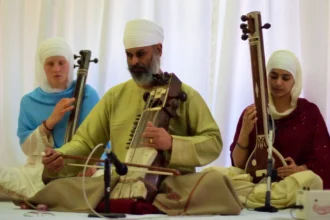Nottingham and Birmingham officials may remove student activists after a judge ruled that human rights were not affected.
Two UK universities were given permission to remove students’ encampments after a judge said protestors had “no prospect” of proving that their human rights would be violated. The two universities are now able to remove protestors after the high court granted them a possession order on Wednesday.
Observing that there were “Many other ways” for activists to exercise their freedom to protest without occupying the campuses, Mr. Justice concluded that the protestors were trespassing.
The network of protest encampments that rose up at UK campuses in protest against Israel’s actions in Gaza has experienced a setback as a result of the high court decision.
The ruling follows a previous case involving the London School of Economics, in which encampments at Queen Mary University of London and the University of Bristol were subjected to similar legal challenges.
Numerous encampments, including the original one at the University of Warwick, have either voluntarily closed for the summer or closed in response to legal action. The University of Oxford students also vacated the Radcliffe Camera Library on Monday.
Protest groups, including those at the University of Manchester, have pledged on multiple occasions to revive the encampments if the disputes persist when the new academic year begins in autumn.
Lawyers for the only named protestor at Nottingham, Joel Butterworth, also known as River Butterworth, argued that by evicting the protestors, the institution failed to follow its own policies and restricted their freedom of expression and assembly.
However, the judge said there was “no evidence” of the university breaking its policies, and the protestors had “fundamentally” violated the university’s codes by occupying the university campus without authorization.
“The court will enable us to ensure that we can take action should the need arise to protect our university community’s health and safety on campus and minimize the disruption to students and staff accessing the necessary teaching, learning and research spaces,” according to a University of Nottingham spokesperson.
A Birmingham protestor claimed the possession order was discriminatory based on her beliefs, saying that “there is no evidence to support such a suggestion.”
In another ruling, 5,000 students suing the University College of London (UCL) for learning loss caused by strikes and COVID-19 closures were not granted because of a group ligation order at the Royal Courts of Justice.
Lawyers representing the students claimed that the matter should be considered a single action. However, because of the potential involvement of 6,000 modules between 2017 and 2022, as well as 440 undergraduate and 675 graduate courses, the judge decided that this was too difficult, given the complexity and timing of individual cases.
Instead, early in 2026, 10 cases will be selected for individual trials. In addition, claimants must provide information about the disruption they experienced during the COVID-19 pandemic and the 43 days of strike action that the University and College Union took. Also, claimants must provide proof of their country of residence between 2020 and 2022.
Jeremy Cook, a senior master of the king’s bench division, expressed the growing cost of legal proceedings, stating that “the overall cost of this litigation will be substantial.” For a prior one-day hearing, UCL’s statements of expresses came to £227,000, while the claimants came to £329,000.
According to Lawyers representing Student Group Claim, the UCL case tests the claims of more than 15,000 present and former UK university studies claiming damages for COVID and strike-related disruption, including lost in-person campus teaching.














